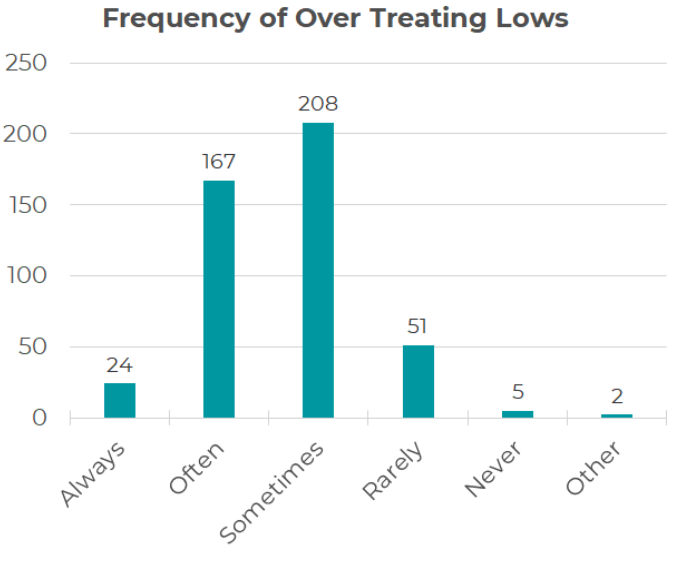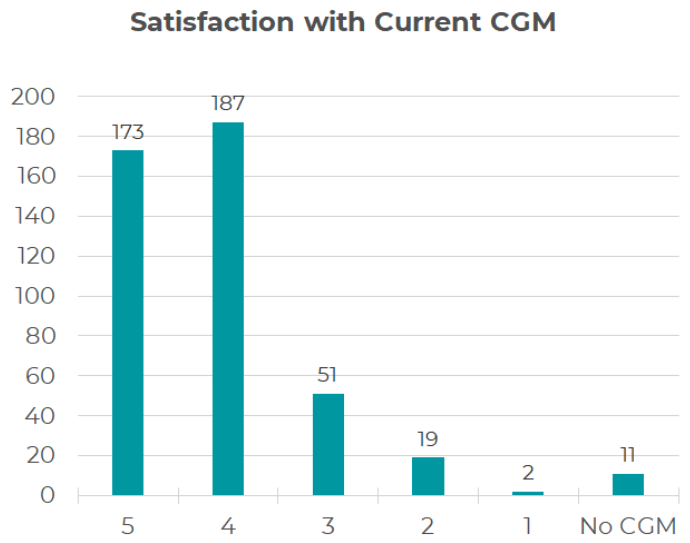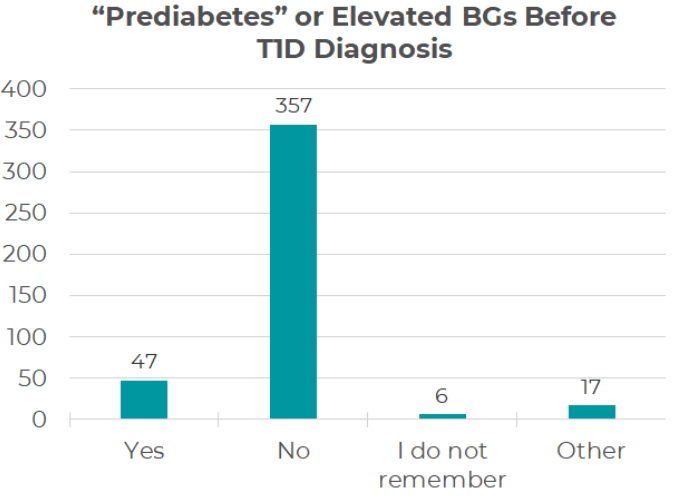
Sign up for a new account.
And get access to
The latest T1D content
Research that matters
Our daily questions
Sign up by entering your info below.
Reset Your Password
Don't worry.
We will email you instructions to reset your
password.
What We Learned from the Online Community This Month
Thank you to every member of the T1D Exchange Online Community for inspiring others who come to this community for advice and to know they’re not alone. Here is what we learned from the 3 most popular questions of September 2021!

When treating a low (i.e, less than 70 mg/dl) how often do you over treat, resulting in high blood glucose levels?
Our most answered Question of the Day this month shows that almost everyone can identify with the unbearable feeling of waiting for a low BG to come back up. 87% of respondents to this question said they over treat their lows at least sometimes, with 5% reporting that they always over treat their low BGs.
Here’s what some community members said about their experiences:
- “When it happens I always overtreat because I hate the shaking, sweating and all the other debilitating symptoms of hypoglycemia so much that I panic treat.”
- “Sometimes when I treat it’s like my digestion is at a standstill or something. There’s no increase in BG, so I’ll treat again. (Sometimes multiple times). And then it’s like my body is like ‘oh, ya…I should do something about this sugar that has been ingested’ and I’ll go up (sometimes to a ‘good’ number and sometimes way higher than I’d like)”
- “I’ve been T1D for over 30 years, and it used to happen entirely too often. I have it down to a science now, unless I wake up with a bad-feeling low.”
- “Waiting is SO hard!!”
- “Years ago, I hit upon a handy tip for dealing with an attack of the Hyposaurus Rex. It was one of those 3am ones. I hate glucose tabs, so I shakily made my way into the kitchen to see if I could find something more palatable. I mean, might as well take the opportunity, right? There was some honey in the pantry, right next to a jar of peanut butter. A lightbulb went off in my hypo-befuddled head. Cuz the problem is the terrible impulse to keep eating SOMETHING even though you know you’ve had enough. And here’s the thing: PB is pretty low carb, goes great with a dollop of honey (high carb obviously) on top, and it’s bulky and pasty and resists being eaten very quickly. So it slows you down and satisfies the urge to keep shoving food in your mouth long enough for the honey to work.”

CGM users: On a scale of 1-5, how satisfied are you with your current CGM? (5 = most satisfied, 1 = least satisfied)
Our second most answered Question of the Day in September showed that the majority of people who use a CGM are quite satisfied with their devices. 81% of community members gave their CGM a 4 or a 5, and 39% said they are the most satisfied.
Here are the most popular comments for this question:
- “I chose 3. I use Medtronic and while the sensors are quite accurate for me, there are a number of things I dislike. They need to be changed weekly which is the shortest life of the 3 on the market. They need to be calibrated multiple times daily. The first day is ridiculous and I often end up going to bed knowing I will have to wake up in the middle of the night because it refuses to move to the 12-hour timer. Also, if you miss the calibration the readings stop. By the next day my sensors almost always are on track and I trust the readings. They do always last a full 7 days but when I try to extend the life the accuracy is good only for another 1-3 days and then they drift farther away from my meter BGs, so it’s not worth it.”
- “5 – Just switched to Dexcom G6 from Medtronic. Medtronic was awful in multiple ways, so I might be honeymooning here, but the Dexcom is like a dream come true. No fingersticks, no incessant calibration alarms, easy insertion, in-cred-ible accuracy. I could go on. I know there are things I’ll think of since anything can be improved, but right now I’m on cloud 9.”
- “Gave it a 5. I use Dexcom G6 and am pretty happy with it. I do agree with wanting a shorter warm-up time, longer sensor life, and less insertion device packaging and plastic to dispose of. The G7 incarnation has made many improvements based on consumer user feedback, so hold your horses before you jump to judgmental conclusions. Diabetes technology things improve with age and lessons learned from feedback and experience.”

Before you were diagnosed with type 1 diabetes, did a healthcare provider tell you that you had prediabetes, or inform you that you had elevated blood glucose levels?
The third most answered Question of the Day this month. The vast majority of people who responded said they had not been told by a healthcare provider they had elevated BG levels or “prediabetes” before diagnosis, however 11% answered “yes”.
Many commenters noted that at the time they were diagnosed, there was no way to tell if a person had T1D or type 2 diabetes, let alone prediabetes. Several other community members told their stories about being diagnosed with type 2 diabetes before later receiving the correct diagnosis of T1D.
Here is what some folks in our Online Community shared:
- “Other. Dx’d with ‘juvenile sugar diabetes’ in December 1962 after having had the mumps several months earlier. In Nov/Dec that year I was progressively experiencing extreme fatigue, weight loss, and excessive thirst with constant need to pee all the time. I recall my mother being told that blood work showed my blood sugar was extremely elevated and I needed to go into the hospital or I could die. No such thing as “pre-diabetes” or even a distinction between T1 or T2 in those days.”
- “In 1954, there was no testing for pre diabetes never mind diabetes! ALL THERE WAS A URINE TEST TO REVEAL IF YOU SPILLED SUGAR IN YOUR URINE!!! My mother recognized I was constantly drinking water. So, she took me to the doctor!!!”
- “I have always thought that ‘insulin dependent’ diabetes should have long ago been renamed ‘insulin deficient’ diabetes because EVERYONE in the human race is insulin dependent whether they have diabetes or not!”
- “Quite the opposite. My family was told that, despite my obvious symptoms, children do not get diabetes. Either I was playing games, or my mother needed counseling. The doctor refused to test my urine.”
We learn something new every day from this community’s Question of the Day responses. Thank you for sharing your experiences and wisdom with us!
If you are not already a member of the T1D Exchange Online Community, join us by clicking the “Join” button at the top of this page.







